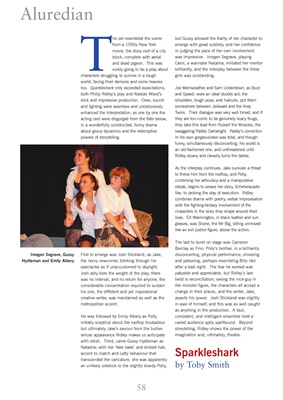
but Gussy allowed the frailty of her character to
emerge with great subtlety, and her confidence
in judging the pace of her own involvement
was impressive. Imogen Segrave, playing
Carol, a wannabe Natasha, imitated her mentor
brilliantly, and the interplay between the three
girls was outstanding.
Joe Merriweather and Sam Underdown, as Buzz
and Speed, were an ideal double act; the
shoulders, tough pose, and haircuts, put them
somewhere between Jedward and the Kray
Twins. Their dialogue was very well timed, and if
they are too comic to be genuinely scary thugs,
they take this lead from Russell the Muscles, the
swaggering Paddy Cartwright. Paddy's conviction
in his own gorgeousness was total, and though
funny, simultaneously disconcerting; his world is
an old-fashioned one, and unthreatened until
Ridley slowly and cleverly turns the tables.
As the interplay continues, Jake survives a threat
to throw him from the rooftop, and Polly,
combining her articulacy and a manipulative
streak, begins to weave her story, Scheherazadelike,
to prolong the stay of execution. Ridley
combines drama with poetry, verbal improvisation
with the fighting-fantasy involvement of the
characters in the story they shape around their
lives. Ed Warmington, in black leather and sun
glasses, was Shane, the Mr Big, sitting unmoved
like an evil justice figure, above the action.
The last to burst on stage was Cameron
Barclay as Finn, Polly's brother, in a brilliantly
disconcerting, physical performance, shivering
and jabbering, perhaps resembling Billy Idol
after a bad night. The fear he evoked was
palpable and appreciable, but Ridley's last
twist is reconciliation; seeing the nice-guy in
the monster figure, the characters all accept a
change in their places, and the writer, Jake,
asserts his power. Josh Stickland was slightly
in awe of himself, and this was as well caught
as anything in the production. A taut,
consistent, and intelligent ensemble held a
varied audience aptly spellbound. Beyond
storytelling, Ridley shows the power of the
imagination and, ultimately, theatre.
Aluredian
58
Sparkleshark
by Toby Smith
T
he set resembled the scene
from a 1950s New York
movie, the dizzy roof of a city
block, complete with aerial
and dead pigeon. This was
surely going to be a play about
characters struggling to survive in a tough
world, facing their demons and some heavies
too. Sparkleshark only exceeded expectations,
both Philip Ridley's play and Alastair Wood's
slick and impressive production. Crew, sound
and lighting were seamless and unobtrusively
enhanced the interpretation, as one by one the
acting cast were disgorged from the flats below,
in a wonderfully constructed, funny drama
about group dynamics and the redemptive
powers of storytelling.
First to emerge was Josh Stickland, as Jake,
the nervy newcomer, blinking through his
spectacles as if unaccustomed to daylight.
Josh ably bore the weight of the play; there
was no interval, and no return for anyone; the
considerable concentration required to sustain
his role, the diffident and yet inspirational
creative writer, was maintained as well as the
metropolitan accent.
He was followed by Emily Albery as Polly,
initially sceptical about the rooftop troubadour
but ultimately Jake's saviour from the bullies
whose appearance Ridley makes us anticipate
with relish. Third, came Gussy Hydleman as
Natasha; with her 'fake bake' and slicked hair,
accent to match and catty behaviour that
transcended the caricature, she was apparently
an unlikely sidekick to the slightly dowdy Polly,
Imogen Segrave, Gussy
Hydleman and Emily Albery